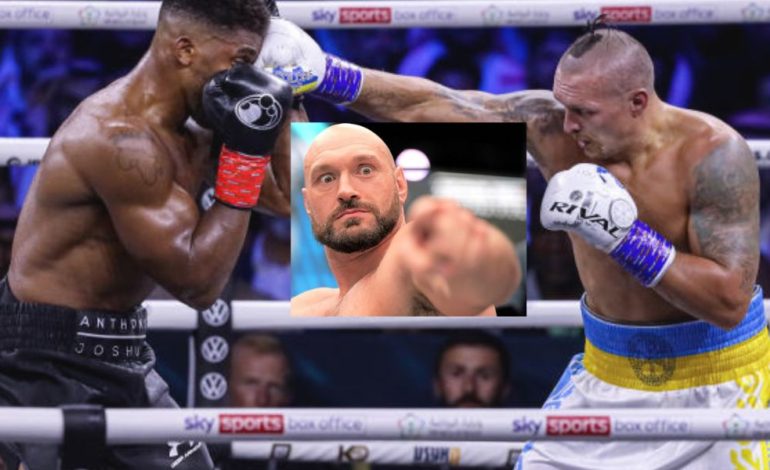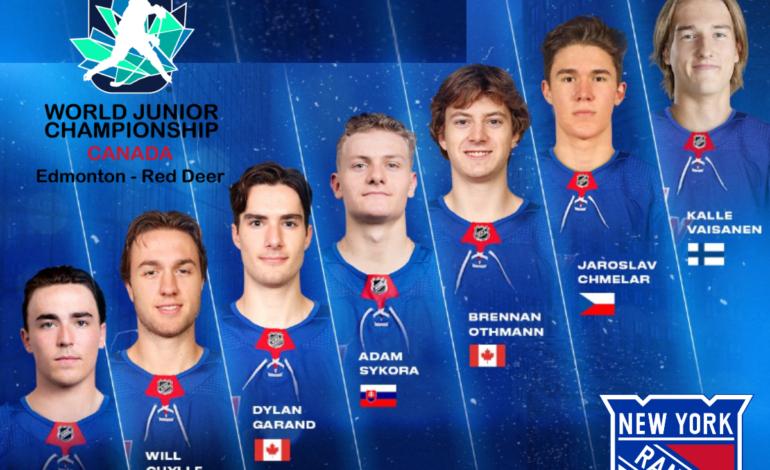Calling a player in a team sport an individual athlete is one of the more damning criticisms in our culture. It implies selfishness, and the inability to coexist. It suggests a player will chase individual glory at the expense of the win. A player labeled an individual faces a tall task to shake the stigma. In this context, I am not implying Kevin Durant is out for personal glory at the expense of his team. If you have listened to and watched him over the years, it’s pretty apparent he chases team success with similar zeal he chases excellence in his craft. He may be moody at times, often prickly, but using those as proxies for individualistic behavior can be a trap. It seems more tension of personality with his chosen profession than some character flaw.
The impetus of the title is due to the reports Kevin Durant has upped his demand of the Nets, “trade me or fire the coach and general manager.” It comes off as selfish. It’s a my way or the highway ultimatum. There definitely is some of that baked into it, but distilling some particular action to “this guy is all about the individual” is a simplistic take on a complicated subject.
Durant has been playing a team sport, by choice, even though his personality seems to fit an individual one.
In sport, whether team or individual, there are certain through lines such as competitive desire, dedication, and will to win. To excel as any pro athlete does, you have to buy into these tenets. From there, different categories of sport, team and individual, have varying characteristics. In the same way sports within each of those categories attract different personalities for different reasons.
Team sports do not all precipitate the same types of interactions. Some individual sports have elements of team competition while others are purely you alone in the competition. Because humans are diverse, no sport draws a monolith. However, many times there are certain personality traits that sort individuals into certain sports. Just like any other interest. Yes, the individual’s skill does matter, but that personality can push two seemingly similar skilled players into different endeavors.
There are certain personality traits that typically draw someone to choose the path of individual sports over team sports, beyond the requisite talent it takes to excel. Playing an individual sport leads to more reclusive training, taking a singular-minded focus where one gets lost in their training towards perfection. You have a coach or trainer around, but thriving off the energy a group brings is not nearly as prevalent.
Just as with anything, there are certain people that enjoy and thrive in that solitude more than others. Getting in touch with their body and its movements becomes as much of a driver as the competition they are training for. It’s highly technical, reacting to, at most, one other competitor, not somewhere approaching double digits, on the low end. The sense of control of outcome becomes greater because it’s about “running your race” in common track parlance.
Uncovering Personality
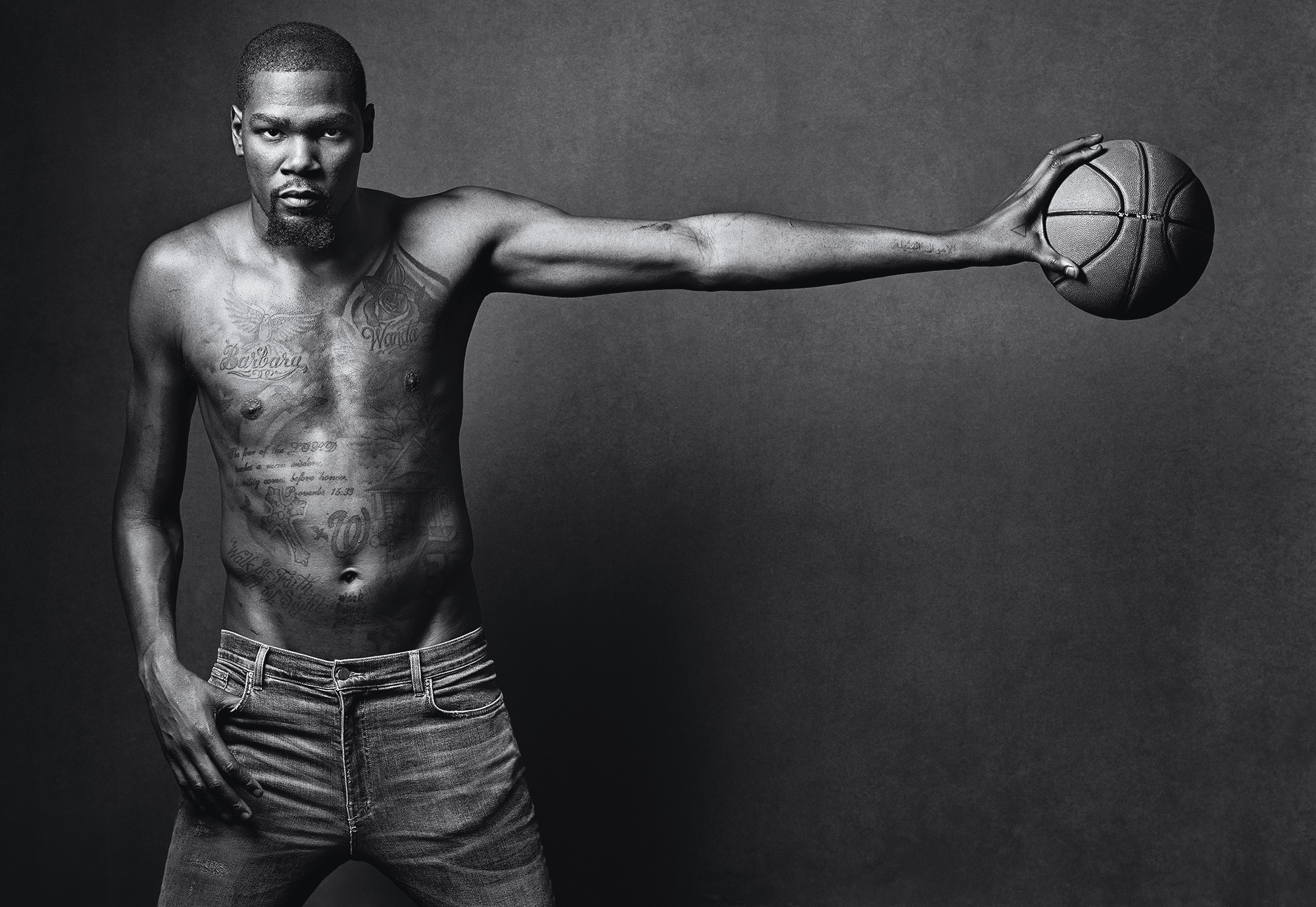
“You don’t know what makes me happy!”
As I thought of Kevin Durant’s recent ultimatum, I recalled his exits from his last two teams, also perennial Vegas favorites. It reminded me of a passage in The Victory Machine by Ethan Strauss. Here, the author is recounting one of his several run-ins with the superstar. After castigating Ethan for an article he wrote about the Warriors attempting to make Durant happy in their offense, KD ended his screed by yelling, “You don’t know me!” You don’t know what makes me happy!”
He’s right. Neither Ethan, nor I, nor (likely) you reading this knows what makes Kevin Durant happy. It doesn’t matter how much we see him online or in interviews, including six with The Ringer’s Bill Simmons. (I did my fair share of research for this, but I wasn’t going back to listen to all of those.) KD is available but guarded, and he has every right to be. With that said, it’s fair for people to wonder: what makes a public figure like Kevin Durant happy?
Part of what makes great athletes great, it’s said, is they are never truly happy, at least when it comes to the game. Great athletes are always on a quest to get more or become better. That insatiable thirst that drives them when it seems like they have everything the game could offer. Durant has shown this on the court, continually adding elements to his game even after an MVP and two titles. However, the words of two journalists writing about his life’s quest seem to show something deeper about his journey.
Both come courtesy of interviews conducted by Colin Cowherd, the first with former Sports Illustrated scribe Lee Jenkins. Jenkins referred to Durant as a searcher, something you don’t here professional athletes typically described as. It raises questions about what he is looking for. Happiness in the game? In life? Both?
Building upon this, long-time Bay Area journalist Marcus Thompson, during his book tour for KD: Kevin Durant’s Relentless Pursuit to be the Greatest, remarked, “He’s a kid who grew up in a really rough situation. He never really had the foundation. His life was so unsettled, so I think he’s still finding that. He’s still looking for that.” With the obvious caveat that upbringing doesn’t necessarily push a personality towards a type of sport, the searching and unsettled nature could become more challenging when having to rely on so many moving parts that make up team sports.
This theme of searching popped up again in a Zach Lowe article following Kevin Durant’s first title with Golden State, as detailed by former Warriors consultant and current (or soon to be fired?) Brooklyn Nets head coach Steve Nash. The two had formed a bond in Oakland, training with each other, and Nash noticed something was off. Nash told Lowe, “He (Durant) didn’t have a great summer. He was searching for what it (the title) all meant. He thought a championship would change everything, and found out it doesn’t. He was not fulfilled.”
Kevin Durant. Champion. Unfullfilled.
Again, it is Durant’s search surfacing again. Is it a search for stability fueled by his upbringing? Is it a basketball thing where he hadn’t figured out what fulfillment and happiness in the game means to him? Or is it broader? A feeling that nothing is ever quite perfect enough to match what he is looking for. That too much of the game and its discourse are outside of his control.
If he had a stopwatch definitively saying who won, would that help him? Would he be more at peace with a racket and an outcome that says, “I’m the best because I won and there was no other help along the way?”
Questions and Tension
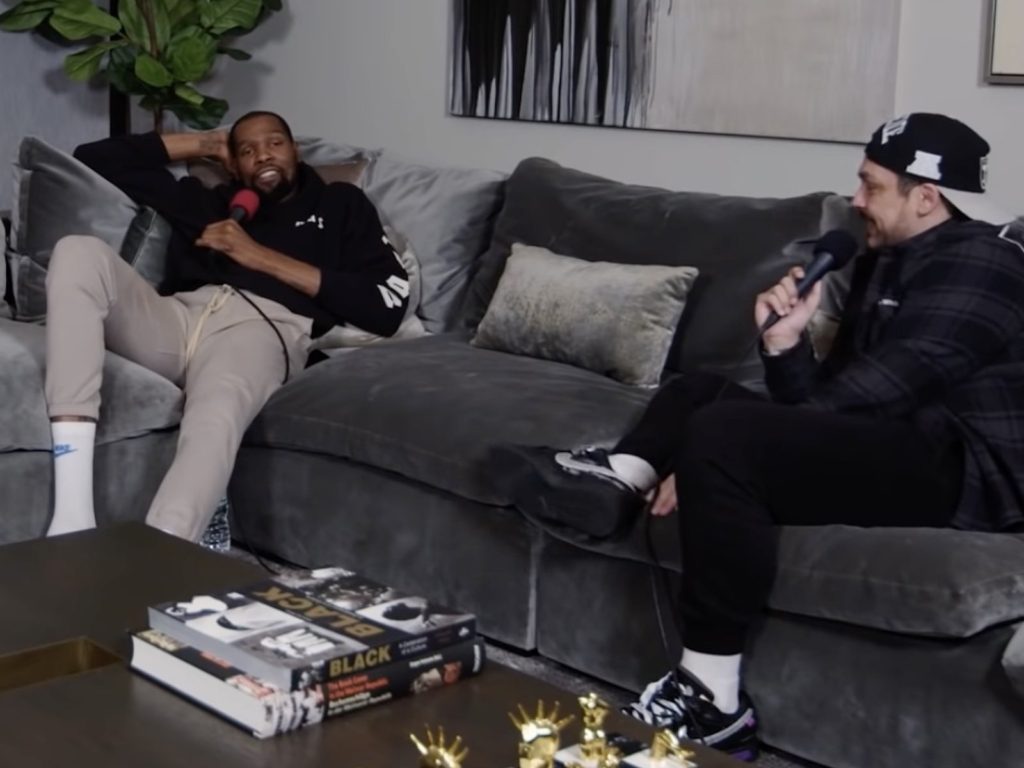
“He’s got a brimming smile and disarming curiosity.”
In The Victory Machine, Strauss highlights another part of Durant’s personality that we have always seen, his curiosity. Or, as Ethan describes it, a “disarming curiosity.” Whether it’s interactions on Twitter, listening to his interviews, or KD’s reaction to a journalist telling him the supposed origin story of his hometown Chesapeake Bay (“That’s incredible…that’s sick. That’s a message to me. You telling me that just took me down a deep hole.”), Durant has always come off as wanting to learn more about the world.
It’s present when he talks about the game, tries to figure out what makes people tick, or his fascinations with the origin story of his home. One could surmise that it helps drive him to be the player that he is today. Tying back into his seemingly constant searching, it can also fuel and frustrate the man as he learns more about the world, people, and himself. A mixture of curiousness, searching, and, potentially, the unseen endpoint can become even more difficult when so many things have to go right in one of your loves to achieve the pinnacle. Wanting, no, needing to know more but feeling you can’t find the bottom. All while relying on a multitude of actors to help you achieve ultimate goals. That seems like a recipe for restlessness. Having to rely only on yourself seems like it would fit much easier.
Yet here Kevin Durant is, a decade-long superstar in the second most popular sport in the country. There is no by yourself when it comes to basketball, much as there isn’t in life. Royce Young, a journalist who covered Durant through the OKC years, commented on certain natures of Durant’s personal relationships. Young summarized, “It’s somebody’s in, somebody’s out. Feuding with this person, not happy with this person, then they make up. Then they come back. That was the experience in Oklahoma City, constantly.”
Is Durant’s tension in relationships combined with a particular search for meaning exasperated by his choice of work? Everywhere he is, there is a built-in reliance on others to help his dreams become realized. His happiness, while, undoubtedly, an inward process first, is also influenced by his fit with those around him. It would make sense then that someone as talented as Durant, with the aforementioned personal processes and characteristics, gets frustrated that his talents are not enough to morph his work life to mesh with his personality.
To the outside observer, KD’s frustrations can seem most prevalent by the fact that he, by his own admission, consumes almost everything written and said about him. Especially in his Warrior days, there were notorious spats with fans and calling journalists out for what they wrote and said, no matter how prominent or not the publication. The lack of control of the narrative or people’s inability to see things the way he did was palpably grating.
Battles and Feuds
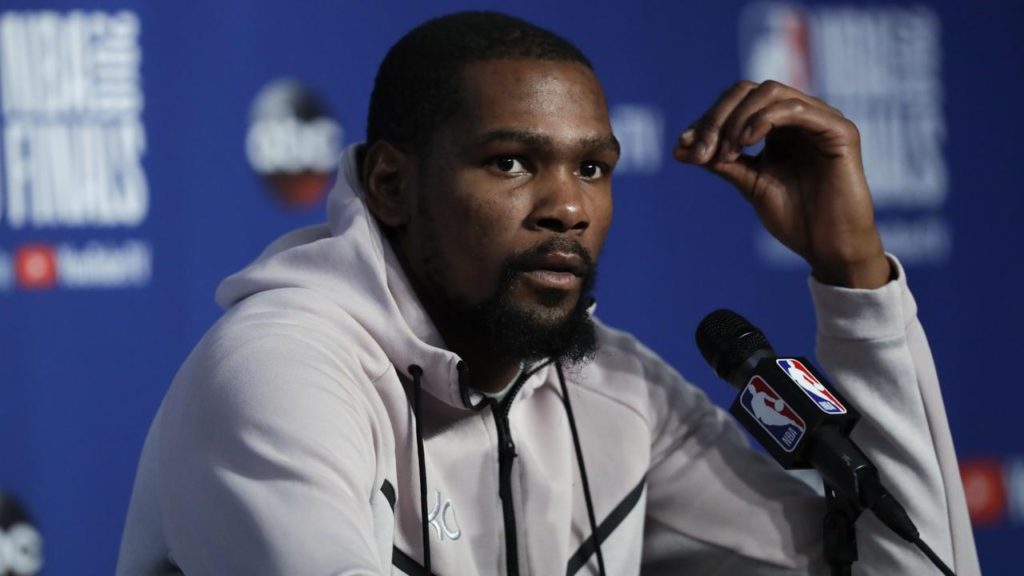
“I hear and I read everything. And don’t you forget that.”
None was more apparent than when he called out Strauss for writing an article in February 2019 about Durant missing eight straight days of media availability and the presumed exit he would make from Golden State that summer. (Strauss was right about the exit and KD’s pairing with Kyrie Irving, wrong about which New York team.) Lest we lose any of Durant’s words, here is his response in full:
Kevin Durant upset with the media and the free agency talk pic.twitter.com/sv1atROacy
— Mark Medina (@MarkG_Medina) February 7, 2019
Two particular quotes stick out to me. One when he says, “I come in and go to work every day. I don’t cause no problems. I play the right way, or I try to play the right way.” The other, after Strauss attempts to explain himself and KD responds, “so? Who are you, why do I gotta talk to you? Tell me. Is that going to help me do my job better? Nah. I didn’t feel like talking.”
First, a common theme with Durant is his focus on playing the right way and feeling that will (should?) absolve him of the chatter that surrounds everything but what happens on the court. He’s doing his job and that’s all that matters, or should matter. The need for others to thrust these other narratives onto the game clearly offends his sensibilities, even if they are correct about these off-the-court dealings.
Second, it highlights his utter disdain for the speculation that surrounds the NBA, particularly transactions, and a seeming inability to let it go. Where other players fall back on cliches, Durant is here to let us know what he thinks when he chooses to. It’s great theater and keeps us talking, but it’s not always the best strategy for maintaining smooth relationships. He doesn’t need the media to do his job well, obviously, but he might need them to advance a message or keep one under wraps until he wants it out. In the same way, he doesn’t really need his teammates to excel, which could be an unsettling feeling when you chose a team game and always have teammates around.
Due to many of these contentious moments, decisions Kevin Durant has made for his own happiness (the team to play for, how he interacts with people) have become huge referendums on who he is as a person. Those referendums were largely harsh on his character and personality. Fans of this team sport took his actions as an affront to the game in a way. A similar reaction is difficult to imagine in an individual sport. Durant’s on-court choices “affect” our viewing experience, and thus are treated as a mutual venture.
In the professional workforce, decisions of athletes in team sports on where and whom to work for carry a particular influence not seen in almost any other profession. Other hypercompetitive and grueling jobs such as those in finance and tech do not have scores of fans tying their happiness to where a high-profile employee chooses to work. A choice to move from Twitter to Instagram or Goldman Sachs to JP Morgan is not met with searing critiques of what this reveals about the star employee. Co-workers or bosses might feel a type of way, but those who religiously use a product or service are not also getting their feelings hurt and lashing out. They merely continue using the product or service. There is no affront.
Yes, fans do have some stake in the game, but the jokes, ridicule, and attacks on his person often seem ready to cross a line into oddly personal. For a person who seems more of an introvert, it’s easy to see why KD is aggravated by the discourse. “If only people just let me do me when it comes to basketball and enjoy the outcome.” It seems so simple, but in a sport that involves so many, is merely focusing on the outcome a reasonable ask?
Connection with the Game
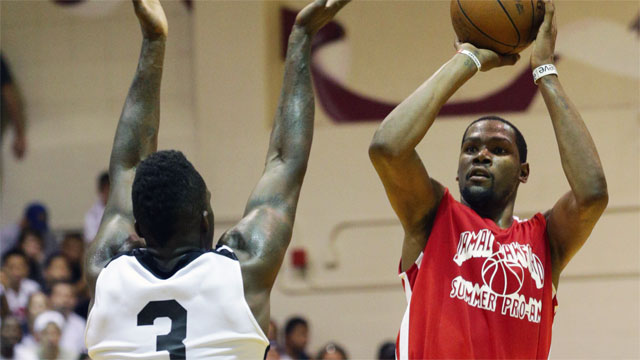
“It’s amazing. It makes me emotional, because it’s just like, Damn, I didn’t know the game could make me think that deep, and feel that deep.”
When it comes to basketball, it’s pretty obvious how much the game means to Durant. In a New York Times profile written on the superstar by Sam Anderson in Summer 2021, one story sticks out. It’s a recounting of the first time his mother took him to a gym at the age of 7. Here is the story in full:
“One day when Durant was 7, Wanda took him to the Seat Pleasant rec center. She did it for much the same reason she used to strap him into a stroller: Maybe basketball could hold him steady, could keep him from bouncing around in the chaos of the world. Durant remembers entering that gym as a full-on spiritual awakening. It was as if the gates of heaven opened. Holy light flooding down. Angels singing.
This actually might be the best way to understand Kevin Durant: as a religious figure. In that gym, almost immediately, he became a sort of basketball monk. On a basketball court, Kevin Durant finally made sense to himself. The game drew on every aspect of his being: the watching, the moving, the thinking, the feeling. It was a deep spiritual channel, a way to align his body and his mind.”
This quick recollection is bookended by Durant attempting to explore with Anderson why he loves the game so much. Why, what many look at as a game, he sees it as a much deeper connection. Hearing Durant discuss how he feels conjures up meditative or psychedelic states that transcend mere connection and experience. We hear how professional athletes love the game, to varying degrees, but they don’t often discuss a connection like this.
The “spiritual channel” KD mentions is another reason I wonder if he was better suited to play an individual sport. You hear him get in-depth talking about the game and it comes off different. Not selfish or individualistic, but the way he sounds is reminiscent of listening to champion athletes in individual sports getting lost in the singularity of their training and competition. As has been explored above, even the team success or individual accolades within the game don’t seem to fully scratch the itch Kevin Durant craves from the game.
Recalling the above quote from Marcus Thompson, the searching KD might be doing in his personal life seems to find a happy place on the basketball court, but not necessarily within a team. Consider the exit of the two teams he played for and the ultimatum given to his current team. There seems to be a challenge with coexistence. Not that it affects his play, as he is MVP caliber or damn near for a decade running now. His ability to get lost in his spiritual place amid chaos and turmoil around him and, possibly, in his head, is a supreme level of focus.
Even still, the search for ultimate basketball happiness continues, from the outside perspective, to evade Durant. If only we, the fans and media, appreciated the game like him things might be different. It’s a common theme you hear from Durant on Twitter, in his infamous blog boys quote, and in various interviews. KD is constantly lamenting for people to respect the game, enjoy the game, and stop using graphs. It’s a pretty simple ask, on its face, but can also miss the point of why people love the game. Kevin Durant is judging the public for how they appreciate the game. It seems fair the public can question how he appreciates it.
Yes, Durant is an authority on how to play, it can be argued, how to analyze, and has different (more?) insight on how to evaluate. But the need, it seems, to make sure the public enjoys the game how he does, is something very rigid. It is eerily reminiscent of how the majority of the public derided his decision to join the Warriors because it didn’t fit with their ideas of how an NBA superstar should go about his career choices. Both come off as very individualized takes to complex and nuanced decisions.
Sticking with Durant in this, it seems the influx of outside opinion into his spiritual realm is not taken kindly nor completely understood why others would view the game so differently. He’s intimate with it, we are not.
Veil of Complexities
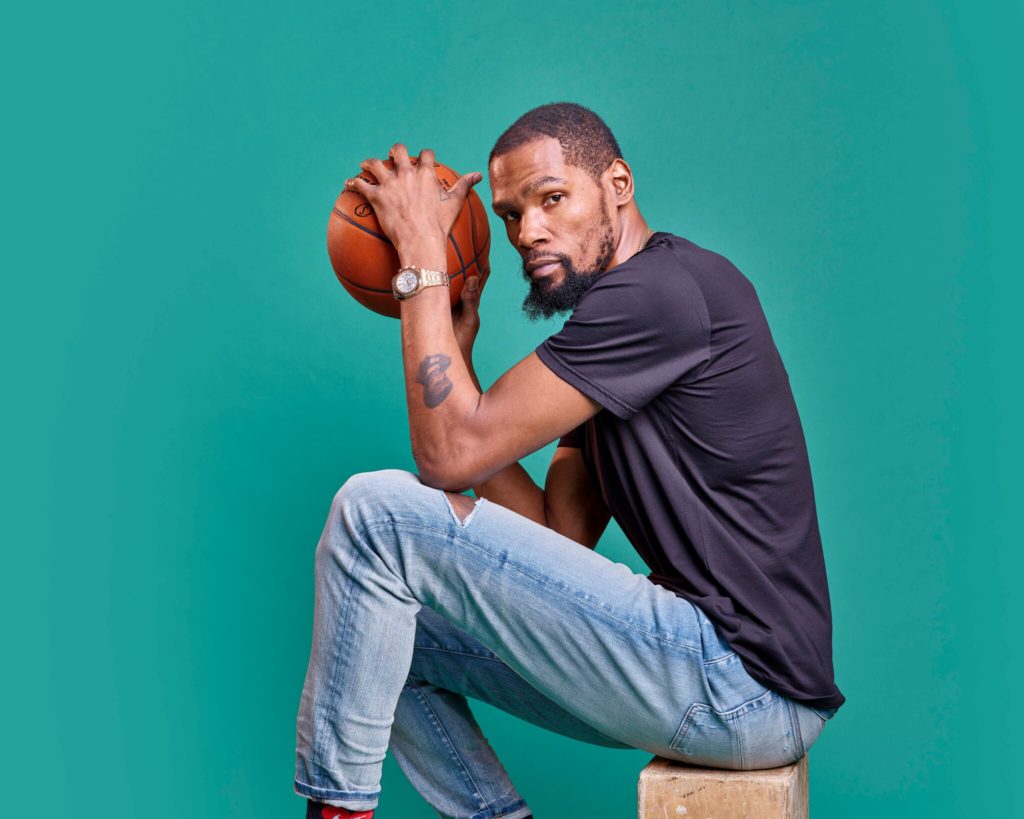
“I’m a very centered, balanced person.”
Returning to Ethan Strauss’ book, he brings up a phrase you will hear if you listen to NBA players and insiders talk enough: he’s a “Different Dude.” This is not to mean there is something wrong with the person. More so that he marches to the beat of his own drum. The NBA, with its interesting balancing act between artistry and team play, is ripe to attract “Different Dudes.”
Other professions you might hear this expression thrown around with are thespians or artists or solo musicians. The ability to get lost in one’s own work, irrespective of anyone else around them, is a hallmark of individual professions. Yes, they work with a cast or editors or band, but there is an understanding that the individual nature of their work can lead to unique personality expressions, in addition to moving to work with new collaborators. Sometimes, when you watch Durant, he can seem like an actor rising above any disjointed nature around him on the court and play with a skill that renders his teammates and competition irrelevant.
Not only is his personality unique, but his game is too. A 7 footer with the fluidity of someone half a foot shorter just doesn’t exist anywhere else. He is one of one.
Durant changed how he organized his approach to his game and training in the early 2010s.“I’ve begun limiting myself to 15 or 16 (apples). Let’s take the wide-open three and the post-up at the nail. Those are good apples. Let’s throw out the pull-up three in transition and the step-back fadeaway. Those are rotten apples. The three at the top of the circle — that’s an in-between apple. We only want the very best on the tree.”
His approach became increasingly predicated on efficiency, ruthless efficiency, as he figured out exactly how he could attack the NBA. It’s like he is searching for nirvana on the basketball court that only true savants can even hope to attain. Maybe he was going to lose a little improvisation that could keep a defense off balance. In response, he would become so good at picking apples, that it mattered little what anyone on the court did.
When listening to people, opponents, fans, or commentators, talk about Kevin Durant, you’ll often hear something to the effect of “he just missed tonight, there was nothing special done.” People make this comment, about Durant more than any other player, because how are you supposed to handle a player too tall for those who can move with him and too quick for those who can look him in the eye? It might be a little simplistic, but watch Durant enough and you can see why it is a common statement.
His body type and skill set make him so unique. Yet he is the ultimate plug into any system player and get 27/7/5 on 52% shooting without a shot forced. It can detract from his greatness because it all seems so effortless and inevitable. Yes, he just dropped 35 on your head, off some midrange curls, a few pull-up threes, and some drives. Nothing particularly eye-opening. It can seem mundane even. He rose to a higher place, simply eliminating the other nine combatants on the court. It became just him, the ball, and the hoop. If you’ve seen it, you know. As he once said, “I’m Kevin Durant. You know who I am.”
The Search Continues
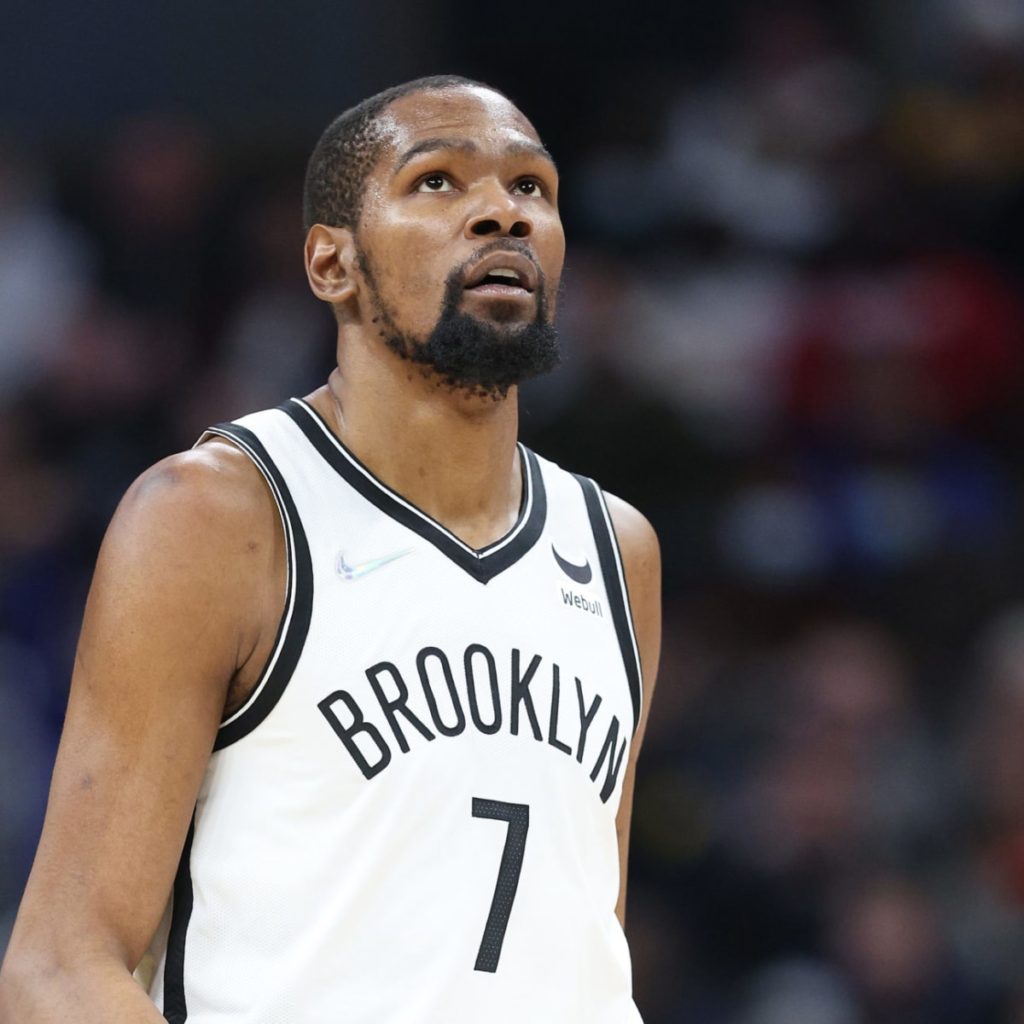
This connection to the game coupled with the uniqueness of his body and skill set makes it easier to grasp why his personality match might be a little off for a team game. The offness doesn’t create a hindrance per se or a least a large one. However, it could explain why similar patterns of unhappiness and restlessness seem to keep popping up.
In Brooklyn, there is current unhappiness with his coach and the front office. Dot connecting makes it a safe guess it is due to their lack of contract offer to Kyrie Irving. Prior to, reports suggested, Irving and Durant weren’t happy with their first coach in Brooklyn, Kenny Atkinson, and worked to get him fired. Golden State saw the unhappiness manifest itself with public and private spats with fans and media, as well as with the team’s scheme and philosophy. In Oklahoma City, the details are a bit murkier, however, his Irish goodbye, similar to his exit from Golden State, suggests there was, at least, some unhappiness with the situation.
Not to say things around him haven’t produced valid reasons to look for a change of scenery from the Thunder, Warriors, and now Nets. Nor is he the first superstar to want change. However, there is something different about how his career has unfolded that makes for a particularly interesting case study. Other stars, from LeBron to Shaq to Charles Barkley to Carmelo Anthony, have provided words and/or deeds that could provide insight into their motivations and desires. With Kevin Durant, we seem to be searching just as much as him, and the lack of clarity makes him all the more fascinating.
For more basketball coverage from Belly Up Sports, tap into our social media handles on Twitter and Instagram. Read additional coverage at Belly Up Sports and follow me on Twitter.


